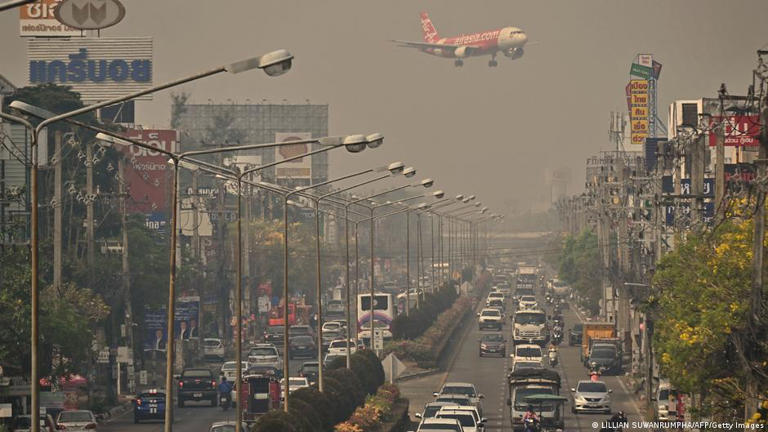Story by Tommy Walker (in Bangkok) •

Bangkok and Chiang Mai ranked among the most polluted cities in the world on some days last year© LILLIAN SUWANRUMPHA/AFP/Getty Images
Thai lawmakers earlier this month endorsed a bill aimed at improving Thailand's poor air quality, clearing the way for the kingdom's parliament to start debating draft legislation.
For years, environmentalist groups have been pushing for new laws to combat Thailand's unhealthy air pollution levels
But why is Thailand keen for such a law and how will it work?
The Thai capital, Bangkok, and the northern city of Chiang Mai ranked among the most polluted cities in the world on several days in 2023.
Thailand's air quality typically plummets between January and March annually — caused in part by smoke from stubble burning by farmers who are preparing for the next crop season.
This results in so-called PM 2.5 dust that contains a high concentration of fine particulate matter, the most dangerous form of haze pollution.

Thailand's air pollution last year saw 2 million people seek medical treatment, according to the health ministry© Pongmanat Tasiri/Zuma/IMAGO
Thai PM prioritizes clean air bill
Following the cabinet's approval of the legislation, it still needs to be debated and clear several more hurdles before becoming law.
But Pravit Rojanaphruk, a veteran journalist and analyst in Thailand, isn't convinced a new law would be the definitive answer.
"Air pollution, particularly PM 2.5 microdust particles, has become a major challenge facing Thai people over the past few years and it may be premature to think that the draft Clean Air Bill, once passed would quickly solve the problem," he said.
The World Health Organization recommends that the annual average concentration of fine particulate pollution should not exceed five micrograms per cubic meter of air. A microgram is a thousand times less than a milligram.
Air pollution in Thailand resulted in around 2 million people seeking medical treatment during 2023, according to the kingdom's health ministry.
Thai Prime Minister Srettha Thavisin admitted Thai people "suffered" from poor air quality and has made the clean air bill a priority.
And according to IQAir an air quality company headquartered in Switzerland, cities in Thailand are some of the most polluted.
Bangkok featured in the Top 5 of last year's rankings. The capital city's urban pollution largely stems from heavy traffic, construction work, factory emissions and trash burning.
Pravit pointed out that, despite the growing popularity of electric vehicles, the volume of gasoline-powered vehicles and their exhaust fumes is increasing.
Vehicle emissions and construction site dust are huge contributions to Thailand's air pollution, he added.
"Despite all this, there's no single NGO or civic group working on the issue full time," said Pravit.
"This can be partly explained by the fact that the problem is seasonal, mostly confined to the dry season from November to April and once it starts raining it's not an issue. Some also feel the problem is too complex to really solve," Pravit told DW.
Finding solutions to Thailand's pollution problems
Kornkanok Wathanabhoom, Mekong Legal Coordinator at EarthRights International, said Thailand needs a decentralized approach.
"One key challenge is because the central government thinks from Bangkok, but all areas in Thailand are different," she told DW.
"There should be decentralization, and give more power to local authority or local governor to create the way to protect the fire burning and also other ways to reduce the burning."
New technology is needed, Kornkanok added, suggesting that stubble burning may not be necessary if consumers are willing to pay more for the end products.
"For example, people said [the farmers are] burning sugar cane because it's easy, but it is costly if they cut without burning. If the cost of the product is higher and everyone understands we have to pay to protect our health, we don't need to buy the air purifiers or face masks."
Environmental groups have also been pushing for Thailand to implement the Pollutant Release and Transfer Register (PRTR), a database of pollutants released into the atmosphere, such as air, water and ground by factories.
Kornkanok is all for it.
"If there is any section related to PRTR, it would be good, people will have access to information. They can create prevent measures from the ministry of public health which is specific for affected people in that area," she said.
Thailand: The rice of the future
But if Thailand's clean air law passes, there would still be difficulties holding people or businesses to account if they were to pollute beyond the limits of the legislation.
Thailand shares borders with several countries, including its fellow Southeast Asian neighbors Laos and Myanmar.
"Contributing factors include burning of agricultural waste both in Thailand and neighboring countries like Cambodia, Myanmar, Laos and Vietnam. It would be difficult to cajole these countries to act if they're not willing," Rojanaphruk said.
Kornkanok echoed this sentiment, saying that enforcing the regulation would be the issue.
"Another challenge is the transboundary haze from the maize agriculture, because in the north we are affected from the corn [feed] for animal seeds, and the sugar plantations from Laos and Myanmar," Kornkanok told DW.
"There will be a problem to sue people outside the country, how they will come to our [Thai] courts. It is challenging for enforcement, you can put in a law but if you cannot enforce it, in reality the law is just on paper."
Edited by: Keith Walker
Author: Tommy Walker (in Bangkok)
No comments:
Post a Comment